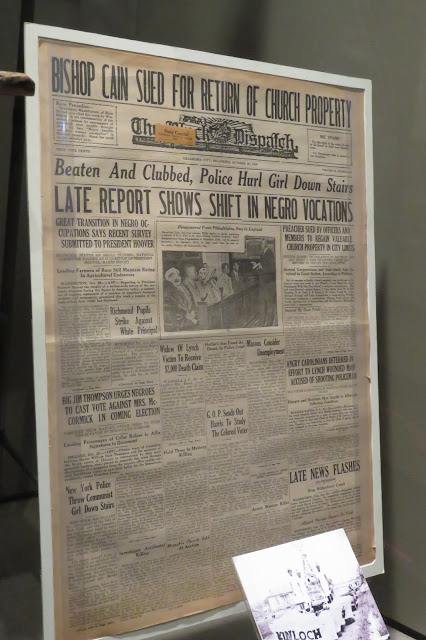Day 43: BB King and the development of Blues
music
This blog entry is not really a travelogue but more a digital version of the Indianola BB King museum. Readers who are not interested in the life of this great musician might care to skip this particular blog entry.
The story of BB King goes right along with the story of his people. I must admit to not having heard of BB King before this tour but the visit to the BB King Museum has given me not only great knowledge of him but huge respect for him. What a man! In this blog I will include photographs of many of the boards with text because they tell the story so clearly, not only of the life of BB King, but of the development of blues music.
BB King was
born in 1925, the son of share farmers.
We learned that after the Civil War, when slave owners were forced to
free their slaves, the huge plantation owners typically divided their huge
acres into small plots of land. Rather
than lose their labour altogether, they offered these plots to their former
slaves, to work and get income from.
Many of the plantation owners set the loan rates for these share farms
so high that the newly freed people would never be able to pay their plot off
in their lifetime. This was the sort of
plight that Riley King’s parents found themselves in and their son, later to be
known as BB, saw only that his was to be the same plight.
Riley walked
six miles each day to a one-room school while his white peers rode on a bus to
their school.
Riley’s
teacher, dedicated to educating African American children, used newspapers
smuggled to him by railway porters from the northern parts of the USA to
supplement the paltry resources that he had for his classroom. Through these newspapers, Riley and the other
children learned of racial tensions and of the success of some African American
people.
His parents
separated and he lived with his mother until she died when he was nine years
old. Then he was taken care of by his grandmother until she too died five years
later. Taking off by bicycle from his
father’s farm where he had now been taken to live, Riley set off on a life by
himself.
Life was
tough for him and for all African American people under the state-sanctioned
segregation policy. But he grew up believing that the best policy was
acceptance of his lot and to not 'rock the boat’.
Only their
faith sustained the African-Americans through the hard times of pests, disease and natural disasters.
The money
that Riley earned as part of St John’s Gospel Singers made Riley yearn for the
big time on Beale St Memphis.
St John’s
Gospel Singers (Riley B. King holding the guitar)
Blues
music, together with a culture of dancing, singing, alcohol and gambling became
the order of the day in the Mississippi Delta area.
Into
Riley’s life now entered Sam Phillips, a man who was instrumental in giving a
start to so many musicians of the day – both black and white.
Sam Phillips pictured here (centre) with Elvis
The term
‘race records’ started to be used to describe the records that were being made
featuring black singers and musicians.
‘Fats’
Domino rose to prominence during this time.
In 1952, BB
at last got his big breakthrough
Determined
to better his lot in life, BB took classes by correspondence while he was on
the road. Here his second wife, Sue,
helps him with his lessons.
By being
billed with other artists, BB encountered a taste of what life was like beyond
the Mississippi delta.
In the
early 1960s, BB’s career was threatened by Rock and Roll and by
rhythm-and-blues, but he had a core following who stood by him.
Then he
made the wise move of adapting to new genres of music…
BB became
despondent about the future of his type of blues music. For the audiences of
the 1960s, BBs blues band and smart dressing didn’t really seem to have wide
appeal.
His
perseverance paid off and eventually led to BB having world-wide acclaim in
high places
Having
previously felt that his humble beginnings were something to be hidden, BB now
felt very proud of his Mississippi delta start in life.
Although
developing into quite a showman with a huge stage presence, until his death in
2015, BB remained a humble man. He is buried here at the BB King Museum in Indianola.








































































